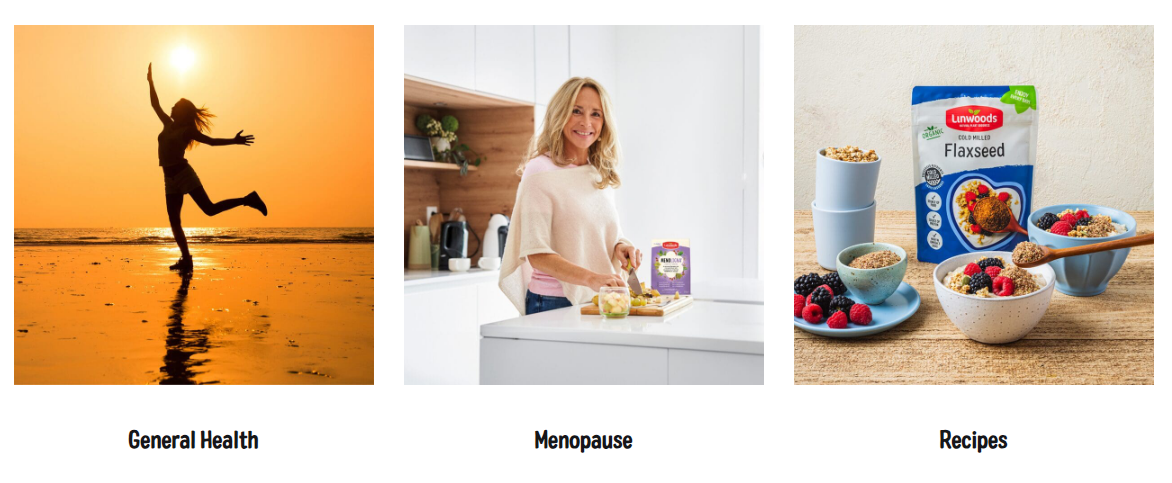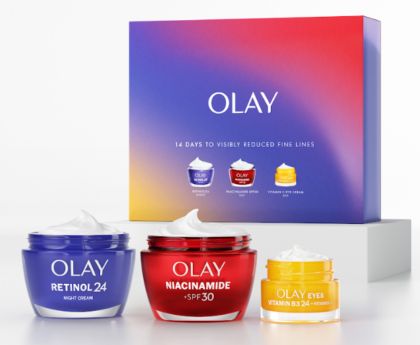Health foods for Menopause – What a Nutritionist recommends.
A SHIFT IN OUR HORMONES CAN BRING ABOUT HOT FLASHES, DISRUPTED SLEEP, CHANGES IN MOOD, WEIGHT GAIN, A SLUGGISH DIGESTION WITH AN INCREASED RISK OF BONE LOSS AND MUSCLE DECLINE.
While every woman’s experience is unique, one thing is clear, the food we eat can play a powerful role in shaping how we move through this transition. By stabilising energy and mood, supporting our hormones, and protecting our long-term health, good nutrition can help us approach menopause with more confidence.
As a nutritionist, I’m often asked which foods are best during menopause and which nutrients matter most. A menopause friendly diet is always one that centres around natural, whole foods while cutting back on highly processed products, sugary snacks, convenience foods, and sweetened drinks. Focusing on adding foods such as sesame seeds for their calcium, or flaxseeds for their lignans, can be especially beneficial, alongside key vitamins and minerals that support our changing needs.
I like to focus on adding in nourishing foods into the diet rather than taking things away, but some foods offer greater benefits for our health than others.
FOODS THAT WE MIGHT WANT TO CUT BACK ON DURING MENOPAUSE:
* Refined carbs (white bread, pasta, biscuits). Quickly raise blood sugar, disrupting our mood and appetite.
* Added sugars. Provide a short burst of energy, followed by energy crashes, irritability, cravings, and weight gain.
* Ultra-processed foods Often low in protein and fibre but high in sugar, refined carbs, and unhealthy fats, leaving us feeling worse physically and emotionally.
* Alcohol Often less well tolerated at this stage of life and for some can worsen hot flushes and night sweats.
* Frequent snacking. Constant snacking can disrupt our natural hunger cues and can make it easier for us to overeat. Balanced, nutritious meals can help to reduce the need to snack.
INSTEAD LET’S FOCUS ON WHAT WE SHOULD BE EATING!
* Lean proteins. Around menopause, falling oestrogen levels can increase muscle and bone loss, and our muscles can become less responsive to protein. Include Greek yogurt, cottage cheese, lean meats, oily fish, tofu, beans, lentils, seitan, seeds, nuts, and eggs. Aim for around a quarter of your plate as protein at each meal.
* Vegetables and fruits: Powerhouses of nutrients, anti-inflammatory plant compounds, and fibre. Aim for at least half a plate of vegetables at your main meals. Go for colour and variety.
* Wholegrain carbohydrates and pulses. Fill a quarter of your plate with wholegrain carbohydrates. Rye bread, quinoa, freekeh, buckwheat, bulgur wheat, lentils, and beans are excellent choices for fibre and sustained energy.
* Healthy fats: Avocados, extra virgin olive oil, oily fish, nuts, and seeds provide the essential fats that nourish our cell membranes and nervous system.
* Soy products: A rich source of phytoestrogens that can support natural oestrogen balance. Try tofu, tempeh, miso, edamame, and soya beans.
FLAXSEEDS, CHIA SEEDS, AND THE POWER OF LIGNANS FOR THE MENOPAUSE
Flaxseeds are a rich source of a type of polyphenol called lignans. Lignans are phytoestrogens (similar to those found in soy) that can help regulate oestrogen in the body. They bind to oestrogen receptors on our cells, offering gentle support when natural hormone levels are low and balancing the stronger effects when levels are high. This gives them a mild oestrogen like effect.
Flaxseeds are also an excellent source of fibre, including soluble fibre, which supports a sluggish digestion and helps maintain healthy gut motility. Their mucilaginous fibre nourishes and supports a diverse gut microbiome. In addition, flaxseeds provide plant omega 3 fats in the form of ALA (alpha linolenic acid), some of which is converted into the active forms EPA and DHA which are vital components of brain tissue and cell membranes.
CALCIUM, VITAMIN D3, AND VITAMIN K2: PROTECTING BONES
As oestrogen declines, bone health becomes a central focus. Oestrogen normally helps maintain bone density, so menopause is often a time when women are at greater risk of bone loss. Three key nutrients work in synergy to help protect bones: calcium, vitamin D3 and vitamin K2.
* Calcium is the mineral that makes up the structure in our bone matrix. Dairy products such as Greek yogurt and kefir, plant foods like sesame seeds and tahini, almonds, and figs, as well as dark leafy greens are excellent sources.
* Vitamin D3 helps us to absorb calcium and phosphorous from our food. In the UK, sunlight is often not sufficient to meet our daily needs, so supplementation is commonly recommended.
* Vitamin K2 acts as a guide, directing calcium to the bone matrix where it belongs and helping to prevent it being deposited in places where it should not be, such as the arteries. It is fat soluble and found in certain cheeses, eggs, and fermented foods such as sauerkraut and natto.
MAGNESIUM: THE MASTER KEY
Magnesium is one of the hardest working minerals in the body, acting as a cofactor in more than 300 enzymatic reactions. It plays a key role in energy production and hormone metabolism, muscle relaxation, bone strength, and nervous system balance. During menopause, when sleep, mood, bone density, and muscle health can all be affected, getting enough magnesium from foods such as leafy greens, nuts, seeds, legumes, flaxseeds, chia and cacao can make a real difference.
MENOLIGNA: SUPPORT MADE SIMPLE!
One product I often recommend to women in midlife is Menoligna, a cold-pressed, sprouted flaxseed blend enriched with chia seeds, added lignans and other key nutrients. It naturally provides lignans, magnesium and omega 3 and is fortified with additional nutrients, such as vitamin D3 and K2 and vitamin B6, all nutrients that directly support women during the menopause.
A CONVENIENT START TO YOUR DAY
Because it is cold pressed and sprouted, Menoligna retains its nutrients during milling. One of the simplest ways to enjoy it is by adding two tablespoons (around 30g) to a bowl of live natural Greek yogurt with probiotic kefir in the morning. Pair this with tahini (for extra calcium), figs (for calcium, potassium, fibre, and polyphenols), and a chipped kiwi (rich in vitamin C and supportive for gut motility) to create a truly menopause friendly breakfast. This combination nourishes bone health, balances hormones, and supports digestion all at once. As a bonus, this breakfast combination provides around 30g of protein and more than 10g of fibre per serving, helping to keep cravings at bay until lunchtime.
About Dominique Ludwig, Nutritionist MSc, Reg. Nutritionist, FBANT
Dominique Ludwig is one of the UK’s leading nutritionists, with over 20 years of clinical experience. She is a King’s College London–qualified nutritionist, Registered Nutritional Therapy Practitioner (CNHC), and a Fellow of the British Association for Nutrition and Lifestyle Medicine (BANT).
Dominique’s no-nonsense, science-backed approach, combined with her calm authority and delicious recipes, has built a fast-growing online community of over 700,000 followers, alongside thousands of participants in her online health and nutrition programmes.
She is a trusted voice in the media, contributing to publications such as The Sunday Times, Times2, The Telegraph and _SheerLuxe. She has also featured on BBC Radio and numerous podcasts. Alongside her media work, she runs a thriving clinical nutrition practice in the South Downs, where her private clients include award-winning actors and global business leaders.
Over the course of three decades, Dominique has worked with more than 4,500 people. She specialises in her signature group programmes, Renew Reset Recharge® and the Triple 30 Nutrition Plan, which have helped thousands achieve sustainable results and build long-term healthy habits. She is currently writing her first book.
She was recently awarded a Fellowship with BANT, recognising her outstanding expertise, leadership, and dedication to advancing the field of nutritional therapy.
Shrivastava, R., Bhattacharya, S., Verma, N., Mehdi, A.A., Pandey, A. and Ansari, J.A., 2025. Dietary status and the effect of flaxseed supplementation on the severity of perimenopausal symptoms. Cureus, 17(2), p.e79725
Nowak, A., Brzóska, M.M., Borowska, S., Sawicka, E., Gromadzińska, J. and Galicka, A., 2023. Effects of flaxseed supplementation on menopausal symptoms and oestrogen metabolism. Healthcare, 11(3), p.395.
Lewis, J.E., Nickell, L.A., Thompson, L.U., Szalai, J.P., Kiss, A. and Hilditch, J.R., 2006. Flaxseed and soy reduce hot flushes more than placebo in postmenopausal women: results from a randomized trial. Menopause, 13(3), pp.423–428
Chen, M.N., Lin, C.C. and Liu, C.F., 2014. Efficacy of phytoestrogens for menopausal symptoms: a meta-analysis and systematic review. Climacteric, 18(2), pp.260–269.
Ma, M.L., Ma, Z.J., He, Y.L., Sun, H., Yang, B., Ruan, B.J., Zhan, W.D., Li, S.X., Dong, H. and Wang, Y.X., 2022. Efficacy of vitamin K₂ in the prevention and treatment of postmenopausal osteoporosis: a systematic review and meta-analysis of randomized controlled trials.
Frontiers in Public Health, 10, p.979649




